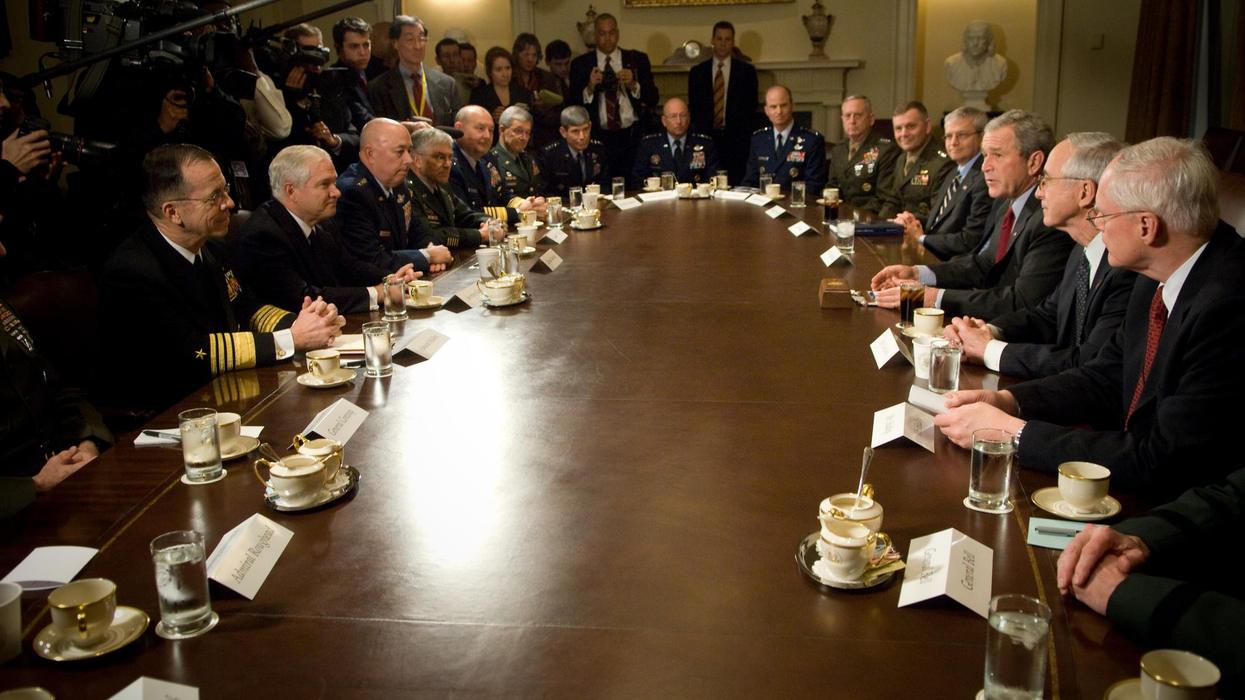WASHINGTON — What do you get when you settle in with a top U.S. Army general for a wide ranging one-on-one interview in front of a D.C. defense industry audience? Certainly not a meal of meat and potatoes — more like a heaping plate of word salad.
The scene was set in the luxury Hamilton Hotel in Washington on Wednesday when Gen. James McConville, U.S. Army Chief of Staff, sat down with Politico’s Pentagon reporter Lara Seligman to open the media platform’s conference, “At a Crossroads: America’s Defense Strategy.”
Here was a dramatic ballroom, lights, cameras, and, unfortunately, what Washington typically considers “action” — the skill of saying a lot without saying very much of anything at all.
This, of course, is fairly disappointing but not surprising. U.S. Generals are by nature not reflective, at least publicly. They are big draws at these events, but they never deliver. One wonders if anyone cares.
Senior officers oftentimes wield a payload of endless military jargon to convey the sense they are carpet bombing you with wisdom and inside information. As this happens, one scrambles to write down everything they say. But, after a closer look at your notes, you quickly spot the decoy. There is no there, there.
For her part, Seligman delivered to McConville a battery of really smart questions, covering everything from Ukraine and China, arms stockpiles, and Army recruitment in the 20 minute conversation. They may have hit their target, but the results were far from satisfying.
Examples were everywhere:
Seligman, about the missile that killed two people in Poland and sparked fears that a NATO ally might have been attacked, asked “can you walk me through what happened at the Pentagon when these reports first came out?”
Gen. McConville: “The Pentagon reacts to any situation that happens around the world. In this case…it becomes a question of let's find out what happened. The first reports, you always want to take a hard look at. Let’s not react too quickly but react with speed or relevance. And so people did the right things. They talked to people to get the questions answered. The big thing is to remain calm during the situation.”
Seligman's follow up: “Is there an open communications channel with Russia to deal with situations like this? And how concerned are you for the potential of miscalculation?”
Gen. McConville: “At my level we don't directly talk to the Russians. That’s done at a higher level with the chairman and the secretary of defense, and they do most of those communications.”
Seligman on battlefield conditions in Ukraine: “Do you agree with (Chairman of Joint Chiefs) Mark Milley [who] said that the fighting is likely going to stall and winter provides an opportunity for peace negotiations? Did what happened yesterday increase the feeling in the Pentagon that now is the time to try and end this war?”
Gen. McConville: “What I try to do is take a look at the Ukrainians, and we always have an acronym in the Pentagon– it is C3W. What that means is what type of capabilities do the Ukrainians have to prosecute what they are doing — and they have pretty good capabilities — what kind of capacity do they have — and they have pretty good capacity — and what type of competence they have — they have and they are very, very competent at what they are doing. Most importantly, what they have, I would argue, is their will to fight."
“Our role in the Army is providing them — along with our allies and partners and other services — the weapons and ammunition they need to do the fighting along with the training and the support and they are very serious about what they are doing and they are very committed.”
Seligman: “Is there a concern about U.S. stockpiles, Western stockpiles, running low?”
Gen. McConville: “We're watching those and one of the things we are working very close with industry is ramping up our organic industrial base in the United States and around the world so when we are in this kind of conflict we have that kind of capability.”
Seligman: "I want to ask you about the US force presence in Europe? Particularly the troops Romania and Poland now. Can you tell me how many troops do we have there, what are they doing and do the events of yesterday raise concerns about risks to our soldiers, in Poland in particular?”
Gen. McConville: (notes that 5th Corps and brigades are there; initially 18th Airborne and 82nd Airborne, recently replaced by 101st Airborne, and modern combat teams).
“We have the sufficient credible combat power to reassure our allies and partners and having been to Latvia, Lithuania, Estonia, and Poland...they are very appreciative of having American soldiers there to support them.”
Seligman asks about U.S force posture in Europe after this conflict:
Gen. McConville: “Policy makers will take a look at what the requirements are. I think NATO is stronger than ever. Many thought conflict in Europe was unimaginable and now they see this happen so they understand the concept of peace through strength and that strength comes from strong allies and partners; it comes from strong militaries. We are providing enough forces to reassure them and make sure we can protect the security of Europe.”
Seligman asks: How "has the status quo changed" in response to aggressive posturing by China against Taiwan?
Gen. McConville: “The president spoke on that and said there’s no (threat of) immediate attack and so from the Pentagon standpoint, I do not have anything to offer on that. From the Army standpoint, we want to be ready. We want to make sure that we have a highly trained and ready Army that is ready to operate in whatever region we need to go to. A lot of the systems that were developing long range precision fires, the aircraft that’s going to go further, the air missile defense, the logistics — we just want to make sure we have a very combat credible force that when the president and secretary of defense calls we are ready to go. That’s what we do.”
Seligman asks how can DoD help both to deter China and help prepare Taiwan:
Gen. McConville: “One of the things we learned from Ukraine is that a regional conflict will have global implications. Whoever starts the conflict will have problems with supply chains and whatever goes along with that. Our role is to make sure we have the ability to make sure we are postured to work with our allies and partners and respond as we are direct by our policy so we can provide the appropriate support.”
Seligman asks about the new National Defense Strategy. What does the DoD need to do to adapt to it?
Gen. McConville: “The pacing challenge — and they use these words — is certainly China and an acute threat is Russia. But really for China, is just making sure we're positioned, we are postured, and have the right amount of forces in the Indo-Pacific. And our strength comes from our allies and partners, making sure we are not only not interoperable or integrated with our allies and partners that share the came concerns, and there is a strength that comes from having strong allies and partners — and just not from the military but economic, and working together, and everyone understands that regional conflict will have global implications and it’s going to hurt everyone’s interest. And it is in every interest that we have a peaceful and stable Indo-Pacific."
To be fair, the 20-minute window was restrictive, and the general was much better when talking about actual weapons — hypersonic, long range missiles and HIMARS, for example. A certain comfort zone for a soldier. But as Army Chief of Staff, it would have been nice to hear him at least try to be a bit more insightful and less rote about policy and strategy in his responses to Seligman’s well-timed questions.
This may have been a lot to chew on, but it certainly wasn't food for thought.

















